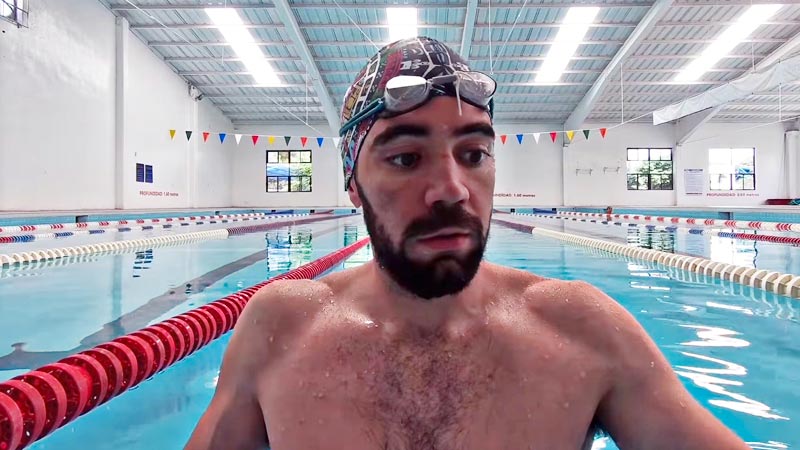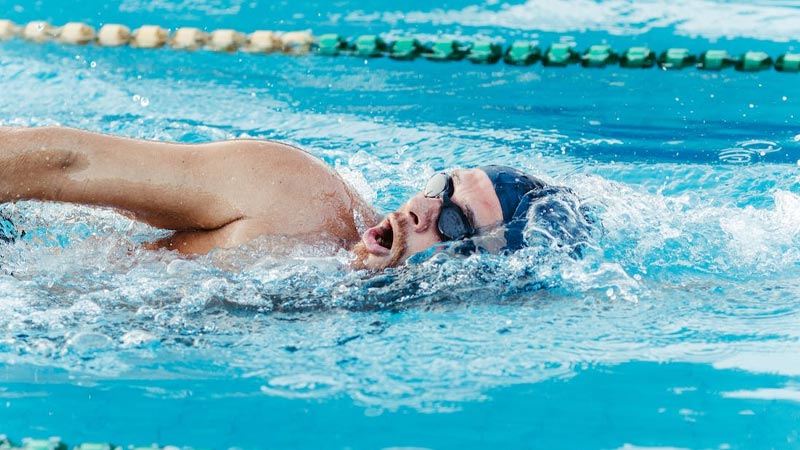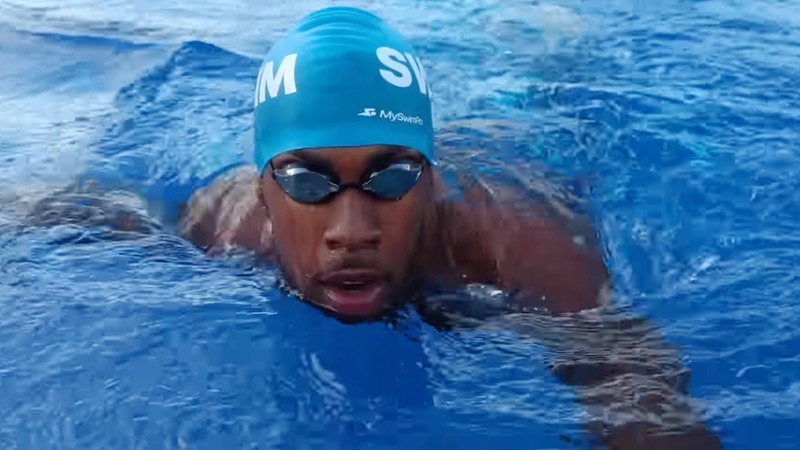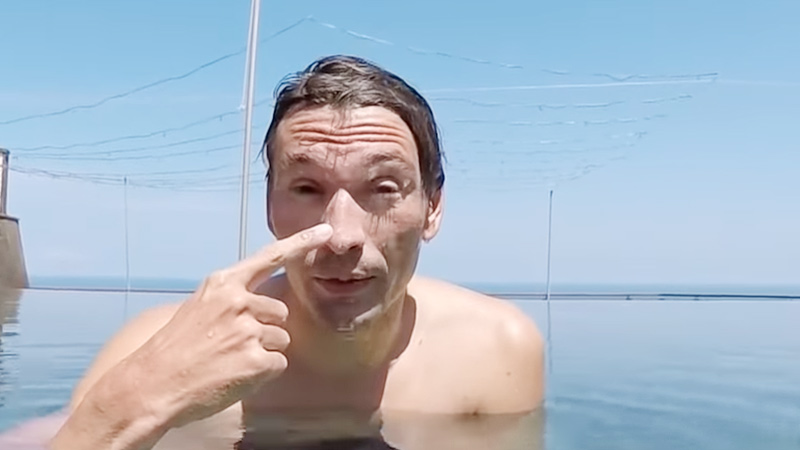If you’ve ever jumped into a pool, finished up your laps, or soaked in a hot tub, chances are you’ve experienced some nasal congestion and stuffiness afterward.
A swimmer’s stuffy nose can range from mildly annoying to downright uncomfortable. But what causes this common post-swim symptom?
The main culprit is the chlorinated water used in most pools. The chlorine acts as a disinfectant, but it can also irritate and dry out the delicate linings of the nasal passages and sinuses.
This alters the pH balance and allows swelling of the nasal tissues, leading to obstruction and stuffiness.
Exposure to bacteria and germs in pools along with the forceful entry of water into the nasal cavity during swimming also play a role.
Underlying allergies and compromised immunity further increase the likelihood of nasal congestion after taking a dip. Read on to learn more about relieving that annoying stuffy feeling after swimming.
Why Do I Get a Stuffy Nose After Swimming?
Getting a stuffy or runny nose after swimming is a common phenomenon and is often referred to as “swimmer’s nose.” There are several reasons why this can happen:
Chlorine or Pool Chemicals
Many swimming pools are treated with chlorine and other chemicals to maintain water quality. Chlorine can irritate the nasal passages and lead to a stuffy or runny nose in some people.
Chlorine can also react with organic substances like sweat, urine, and skin cells in the pool water, forming chloramines, which can irritate the respiratory system.
Irritants in the Water
Pools may contain other irritants, such as bacteria, algae, or contaminants from swimmers (e.g., sweat, urine, sunscreen) that can affect the nasal passages when inhaled or come in contact with the mucous membranes of the nose.
Exposure to Cold Water
Swimming in cold water can cause your blood vessels to constrict, which can reduce blood flow to the nasal passages and lead to congestion.
Dry Air
The air around swimming pools is often dry due to the evaporation of water from the pool. Breathing in dry air can dry out the nasal passages, making them more susceptible to irritation and congestion.
Allergic Reactions
Some individuals may be allergic to pool water, pool chemicals, or other environmental factors near the pool, and this can lead to allergic reactions like a stuffy or runny nose.
Physical Activity
The physical activity of swimming can cause your body to release histamines, which can lead to nasal congestion, similar to what happens during exercise-induced rhinitis.
Chlorine and Pool Chemicals Regarding Blocked Nose After Swimming
Chlorine and other pool chemicals can irritate the mucous membranes of the nose, causing symptoms like a runny nose, sneezing, and congestion.
This is because chlorine reacts with organic matter in the pool water, such as sweat, urine, and skin cells, to form chloramines.
Chloramines are volatile, meaning they evaporate quickly and can be inhaled. When inhaled, chloramines can irritate the lining of the nose and sinuses.
In addition to irritation, chlorine, and pool chemicals can also dry out the mucous membranes of the nose, which can make them more susceptible to irritation and infection.
This is because chlorine reacts with water to form hypochlorous acid, which can damage the delicate tissues of the nose.
The effects of chlorine and pool chemicals on the nose can vary depending on several factors, including:
- The amount of chlorine in the pool water: The higher the chlorine level, the more likely you are to experience irritation.
- Your sensitivity to chlorine: Some people are more sensitive to chlorine than others. If you have allergies or other respiratory problems, you may be more likely to experience irritation.
- The length of time you spend swimming: The longer you spend swimming, the more likely you are to breathe in chlorine and pool chemicals.
- Whether you are indoors or outdoors: Chlorine evaporates more quickly in dry air, so you are less likely to experience irritation if you swim outdoors.
If your symptoms are severe or do not improve after a few days, see a doctor. They can rule out other causes of your blocked nose and recommend treatment options.
Nasal Congestion After Swimming

Swimming is a popular recreational activity that offers numerous health benefits, including improved physical fitness, stress reduction, and enhanced cardiovascular health.
However, for some individuals, swimming can lead to unpleasant side effects, including nasal congestion. This common issue can disrupt daily activities and affect overall well-being.
Causes of Nasal Congestion After Swimming
Several factors contribute to nasal congestion after swimming:
- Chlorine exposure: Chlorine is widely used in swimming pools to disinfect the water and prevent the spread of bacteria. However, chlorine can irritate the delicate mucous membranes of the nose, causing inflammation and excess mucus production.
- Allergies: Individuals with allergies may experience nasal congestion after swimming due to the presence of pollen, dust mites, or other allergens that may be present in the pool water or the surrounding environment.
- Water intrusion: When water enters the nasal passages during swimming, it can trigger the production of nasal mucus as a protective mechanism. This can lead to a runny or stuffy nose.
- Cool air: After exiting a warm pool, the sudden exposure to cooler air can cause the nasal passages to constrict, leading to congestion.
Preventive Measures
To minimize the risk of nasal congestion after swimming, consider the following preventive measures:
- Swim in outdoor pools whenever possible: Outdoor pools are less prone to accumulating pollen and other potential allergens.
- Use a nose clip during swimming: A nose clip can effectively prevent water from entering the nasal passages, reducing the risk of irritation and congestion.
- Rinse your nose after swimming: Once out of the pool, rinse your nose thoroughly with a saline solution or plain water to remove chlorine and other irritants.
- Dry your hair and skin thoroughly: Leaving wet hair and skin can promote bacterial growth, which can contribute to congestion and other respiratory problems.
- Consider using a humidifier: A humidifier can add moisture to the air, helping to prevent nasal passages from drying out and becoming irritated.
Additional Tips
- Avoid swimming if you have a cold or other respiratory infection. Swimming can worsen these conditions and make you more susceptible to congestion and other complications.
- If you experience persistent nasal congestion or other respiratory issues after swimming, consult with a healthcare professional. They can identify the underlying cause and recommend appropriate treatment options.
- Regular swimming can be a valuable part of a healthy lifestyle. By taking preventive measures and seeking professional guidance if necessary, you can minimize the risk of nasal congestion and enjoy the benefits of swimming without the uncomfortable side effects.
Sinus Infection After Swimming

Here is some detailed information on the causes of sinus infections after swimming:
Chlorinated Water
The chlorine used to disinfect swimming pools can irritate and dry out the nasal passages and sinuses, making them more susceptible to infection.
The high amount of chlorine in pool water can damage the protective mucus membranes in the nose and sinuses.
Bacteria in Water
Pools, hot tubs, lakes, rivers, etc. contain bacteria from people’s bodies as well as the environment.
Some common bacteria found in these water sources include Staphylococcus aureus, Pseudomonas aeruginosa, and Klebsiella pneumoniae. These bacteria can enter the nasal cavity and set up an infection.
Forceful Entry of Water
Activities like diving or jumping into the water may force water into the nasal cavity with some pressure, pushing bacteria and chemicals into the sinuses and nasal passages.
This can irritate the linings and make it easier for an infection to occur.
Allergies
People with allergies like hay fever already have inflamed sinuses and nasal tissues.
Swimming can further aggravate these tissues and make them more vulnerable to infection. The chemicals in pool water may also trigger allergy symptoms.
Weakened Immunity
Fatigue, inadequate sleep, stress or other factors that compromise the immune system can increase the likelihood of developing a sinus infection after swimming.
A lowered immune response makes it easier for bacteria to grow and cause an infection.
Previous Respiratory Illness
If someone has had a recent cold, flu, or other respiratory illness, the sinuses and nasal cavities are already inflamed and irritated.
Swimming under these conditions can further exacerbate the inflammation and lead to a bacterial sinus infection.
The combination of chlorinated water, bacteria exposure, irritation of nasal tissues, and a compromised immune system are the primary causes of sinus infections associated with swimming.
Proper pool maintenance, good swimming hygiene, and avoiding swimming when ill can reduce risk.
How to Get Rid of Stuffy Nose After Swimming?

Here are some helpful tips for getting rid of a stuffy nose after swimming:
- Use a saline nasal spray or rinse: Saline solutions can help flush out chlorine and bacteria from the nasal passages and sinuses that may be causing congestion. Make sure to use a sterile nasal rinse product.
- Try a nasal decongestant: Over-the-counter nasal decongestant sprays like oxymetazoline can provide temporary relief by constricting blood vessels in the nasal tissues. This can reduce inflammation and open up the nasal airways.
- Use a humidifier: Dry air from indoor pools, hot tubs or cold weather can dry out nasal passages. Running a humidifier adds moisture back and can loosen mucus.
- Stay hydrated: Drink plenty of fluids like water or broth to thin out mucus and prevent dehydration which thickens secretions.
- Irrigate with warm water: Rinsing the nasal cavity with warm water can help relieve congestion. Use distilled, boiled or filtered water to prevent additional irritation.
- Apply warm compresses: Placing a warm, wet washcloth over the nose and cheeks can open up nasal passages and provide relief from stuffiness.
- Use OTC medications: Antihistamines, decongestants, and nasal sprays can all help reduce post-swim congestion. Consider medication if symptoms persist.
- Rest and sleep: Allow time for rest after swimming to allow the nasal tissues to recover. Sleeping propped up on pillows can also minimize stuffiness.
- Avoid irritants: Prevent further irritation by avoiding tobacco smoke, heavily chlorinated pools, cold air or allergens until nasal congestion improves.
See a doctor if congestion persists for more than a few days or if you develop any signs of sinus infection after swimming. Prompt treatment can provide effective relief.
When to Seek Medical Advice for Mucus After Swimming
Here are some guidelines on when to seek medical advice if you have excessive mucus or congestion after swimming:
- Symptoms last more than 3-4 days – If nasal discharge, coughing, stuffy nose, and other symptoms persist beyond a few days, it’s best to see a doctor. This could indicate a bacterial infection that may need antibiotics.
- Fever develops – A fever along with mucus or congestion signals an infection that requires medical treatment. Fever indicates the body is fighting off an infection.
- Facial pain or pressure – Mucus after swimming is normal, but facial pain or pressure around the cheeks, eyes, or forehead is not. This can indicate sinusitis and needs evaluation.
- Green or yellow mucus – Thick, discolored mucus, especially green or yellow, indicates likely infection. The color comes from an excess of white blood cells fighting bacteria.
- Difficulty breathing – If breathing becomes very difficult or you feel short of breath, this warrants prompt medical care to rule out complications.
- Headache – Severe or persistent headaches after swimming may be from pressure in the sinuses due to a sinus infection. Seek treatment.
- No improvement with over-the-counter meds – If saline sprays, decongestants, or antihistamines provide no relief, a doctor can prescribe stronger medication or rule out underlying illness.
- Weakened immunity – Those with weakened immune systems are at higher risk of developing infections and should seek care for mucus with no improvement.
It’s always best to check with a doctor if any symptoms seem severe or unusual. Prompt diagnosis and treatment of sinus infections can prevent more serious complications.
FAQs
Is it normal to have congestion after swimming?
It’s relatively common to experience congestion after swimming, especially in chlorinated pools.
This is often referred to as “swimmer’s rhinitis.” Chlorine and other pool chemicals can irritate the nasal passages, leading to congestion, sneezing, and a runny nose.
How to stop a runny nose after swimming?
To alleviate a runny nose after swimming, you can try the following:
- Gently blow your nose to remove any water and irritants.
- Use a saline nasal spray or rinse to flush out irritants.
- Apply a nasal moisturizer to prevent drying of the nasal passages.
- Avoid swimming in heavily chlorinated pools, or wear a nose clip to reduce exposure to chemicals.
- Consider antihistamines or decongestants under medical guidance.
How to stop being congested after swimming?
To reduce congestion after swimming, you should blow your nose gently to clear any water or irritants. Use a saline nasal spray or rinse to soothe and clean nasal passages. Stay hydrated to keep nasal mucus thin.
Opt for natural remedies like steam inhalation with essential oils to alleviate congestion. Consult an allergist or ENT specialist for long-term solutions if congestion persists.
Can swimming in saltwater cause congestion?
Swimming in saltwater, like in the ocean, can also cause congestion in some individuals.
The high salt content can irritate the nasal passages, leading to congestion. It’s often referred to as “seasickness.” Using a saline nasal spray after swimming in saltwater can help alleviate this congestion.
What if congestion after swimming is persistent or severe?
If congestion after swimming becomes chronic or severe, it could be due to allergies, sinusitis, or other underlying conditions.
It’s advisable to consult a healthcare professional, such as an allergist or ear, nose, and throat specialist (ENT).
Wrapping Up
While a stuffy nose after swimming can be normal, there are ways to find relief through proper hydration, nasal sprays, and over-the-counter medications.
Seek prompt medical attention if you have symptoms like facial pain, headache, fever, or colored discharge as these may indicate a sinus infection.
With some simple remedies and precautionary measures, you can still enjoy swimming without suffering from prolonged congestion.
Remember to shower after swimming, refrain from swimming when ill, and consider wearing a nose clip to limit chlorinated water exposure.
Pay attention to your body, and see a doctor if symptoms persist or worsen. With the right treatment, you’ll be ready to dive back into the pool discomfort-free.







